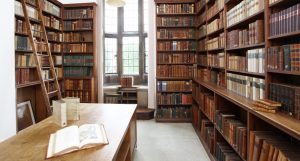Somerville College has acquired two letters by John Stuart Mill and two books from his library in Avignon, France, where he died in 1873, in the first major addition to our Library’s Mill collection since it was established in 1905.
The acquisitions will enable academic researchers to expand their knowledge of Mill’s personal library and further explore what the collection tells us about the foremost British philosopher of the nineteenth century.
The collection was donated to Somerville by Mill’s step daughter Helen Taylor in 1905. The college has been working to ensure that the volumes are saved for the future with preservation and, where necessary, repair.
Albert Pionke, a Victorian specialist at the University of Alabama, has been engaged in a wide-ranging examination of the scribbles and doodles in the margins of Mill’s personal library.
This search has provided a fuller portrait of the philosopher and uncovered dozens of different kinds of marginalia – including chevrons, question marks and arrows.
Dr Anne Manuel, College Librarian, said: “We have decided actively to look for books that belonged to John Stuart Mill whether they had been part of his Avignon Library, part of his London Library but not received by Somerville in 1905 or items that have disappeared from the library in the 60 years that these books were on open shelves in the college library.
“Our hope is, that by bringing the collection together – making it whole – we will be able to expand our knowledge of what the marginalia means.”
Professor Pionke said: “Although not originally part of Mill’s library at Blackheath, these new acquisitions do enlarge our knowledge of his intellectual and epistolary environs, and further solidify Somerville’s position as a key centre for the study of the life and writing of John Stuart Mill.
“Mill’s unpublished works, which include the two previously unknown letters and his copious marginalia, are a particularly rich source of new knowledge about one of the foundational architects of modern liberal theory and its institutions, in Britain, the Commonwealth, Japan, and throughout the world.”
The acquisitions, which were made with the assistance of donor Christopher Kenyon, will be on display to the public at an open day on November 6, when Professor Roger Crisp of St Anne’s College will be available to talk about their significance.
Professor Crisp said: “These acquisitions are both significant and fascinating. It seems to me especially appropriate that one of them, a letter expressing Mill’s support for the National Society for Women’s Suffrage, has ended up at Somerville. It was written in 1868, fifty years before the right to vote was extended to any British woman.”
The marks and annotations can be explored in depth at: http://millmarginalia.org/
